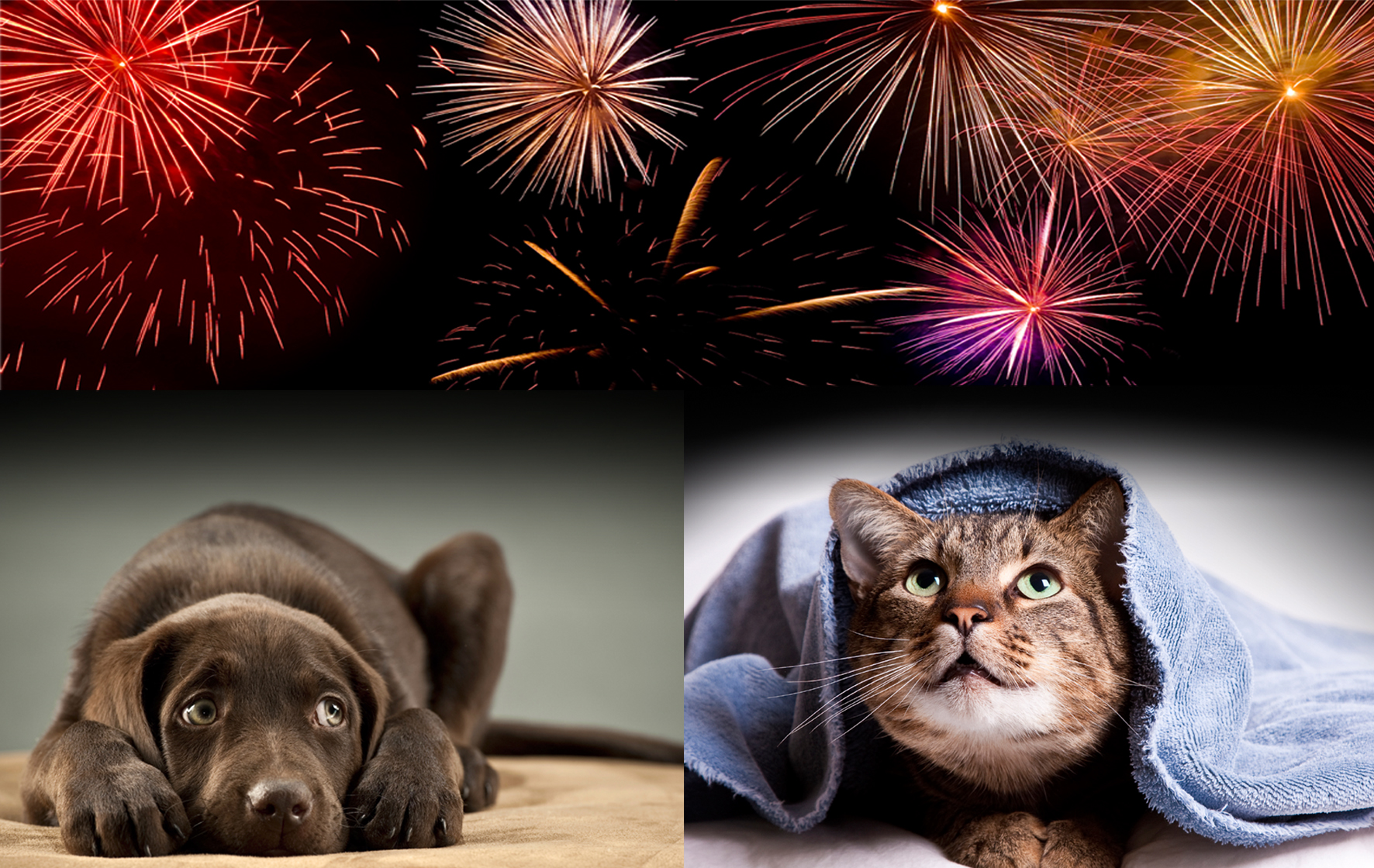Fireworks and Your Pet: Tips for Staying Safe This Fourth of July
Fireworks and Your Pet: Tips for Staying Safe This Fourth of July
Independence Day is tomorrow! The Fourth of July is always a great day to celebrate with family, friends and fur babies alike. While it may seem like a great idea to treat your pet to some celebration scraps and have them join in on all of the fun, the reality is that some festive foods and activities can be hazardous to your furry friends. People all across America are struggling with pet anxiety and The Fourth of July is a big stressor for many of them. We wanted to share tips from the ASPCA Animal Poison Control Center (APCC) to help keep your pet safe this holiday!
Never leave alcoholic drinks unattended. It’s no secret that alcoholic beverages have the potential to poison pets. If ingested, your pet could become very intoxicated and weak, severely depressed or could go into a coma. Death from respiratory failure is also a possibility in severe cases.
Keep an eye on those chemicals. Do not apply any sunscreen or insect repellent product to your pet that is not labeled specifically for use on animals. Ingestion of certain sunscreen products could result in drooling, vomiting, diarrhea, excessive thirst and lethargy. The misuse of insect repellents that contain the chemical DEET can lead to neurological problems. You should also keep citronella candles, insect coils and oil products out of pets’ reach, too.
Be wary of where you keep your matches and lighter fluid.Certain types of matches contain chlorates, which could potentially damage blood cells and result in difficulty breathing—or even kidney disease in severe cases—if ingested. Lighter fluid comes with its own set of dangers, and can be irritating to skin. If ingested, it can produce gastrointestinal irritation and central nervous system depression. If lighter fluid is inhaled, aspiration pneumonia and breathing problems could develop.
Keep your pets on their normal diet. Sudden changes in your pet’s diet (even if it’s just for one day) can sometimes lead to indigestion and diarrhea. This is particularly true for older animals who have more delicate digestive systems and specific nutritional requirements. Not to mention, foods such as onions, chocolate, coffee, avocado, grapes, raisins, salt and yeast dough can all be potentially toxic to companion animals. Check out our full list of people foods to avoid feeding your pets for more information, and consider packing some of your pet’s favorite usual treats to give them something special on the holiday!
Remember to keep a no-glow zone. For parties and celebrations that last into the night, glow sticks and glow jewelry are popular party favors. While the luminescent substance contained in these products is not highly toxic, excessive drooling and gastrointestinal irritation could still result from ingestion, and intestinal blockage could occur from swallowing large pieces of the plastic containers. Be sure to keep those items reserved for your human guests and avoid putting them on pets.
Be careful when it comes to fireworks! While exposure to lit fireworks can potentially result in severe burns and/or trauma to the face and paws of curious pets, even unused fireworks can pose a danger. Many types contain potentially toxic substances, including potassium nitrate, arsenic and other heavy metals. Loud noises can also be a big concern for some sensitive pets. See APCC’s full list of fireworks safety concerns and tips for more information.
Fieworks are the most common trigger for fearful behavior in dogs.
A 2013 study by the University of Bristol’s School of Veterinary Sciences found fireworks were the most common trigger for fearful behavior in dogs. Responses included:
trembling
shaking
hiding
seeking comfort
destruction
urination
salivation
So, why are dogs afraid of fireworks, and what can we do to help them? Fortunately, there are plenty of simple strategies for dog owners. From distraction to anti-anxiety vests and more, here’s some tips you need to help your pet feel better when the noises start.
Preventing escapes
Keep gates and doors closed. Given all the excitement around Independence Day parties, it isn’t uncommon for some pets to get scared and run away. Be sure that all exits are securely closed, and that your pet is inside or in your sight at all times. More dogs going missing over the 4th of July than at any other time of year. This can happen when you least expect it!
To help:
Make sure your dog has identification. Even indoor pets can panic and use drastic measures to escape when frightened I’ve known many a dog to jump through a window or through a fence to get away from the loud noises.
Micro-chipping your dog is a good protective step! Collars can come off and tags can get lost, but a microchip is forever! Make sure your pets microchip registration information is up to date so people can contact you when needed!
Do not leave your dog unattended at home. If you are headed out to enjoy the holiday without them, find a sitter. If you do not have a pet-sitter already, Rover has short-term sitters for just such situations.
I lost my pet! What should I do?
Please contact the Linda McNatt Animal Care & Adoption Center directly at 940-349-7594 to determine if your pet has been received at the shelter. If your pet is at the shelter, visit How to Recover Your Pet for information on reclaiming it. You may want to distribute flyers in your neighborhood, place a photo on the City of Denton Animal Shelter Facebook page and our Facebook page, consult your local newspaper and place a free newspaper ad. You may want to contact local rescue groups as well.
Most Veterinarians are closed during holidays, but the Denton County Animal Emergency Room will be open from 7/3 at 5:00pm to 7/5 at 8:00am.
(940) 271-1200
4145 S Interstate 35 E Ste 101
Denton, Texas 76210
Most pets have some level of fear when it comes to fireworks. You know your pet best, and will know how much to intervene during the festivities. When in doubt, remember that prevention, distraction, and lots of love are always a good idea!


